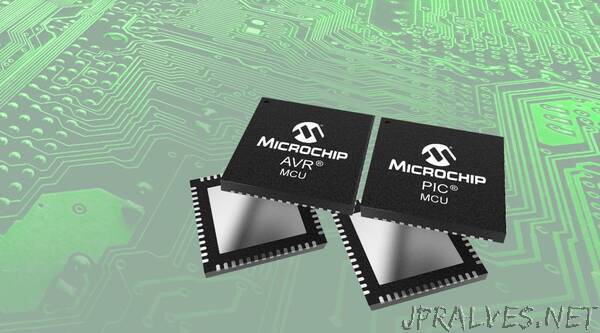
“Microchip grows its commitment to the 8-bit PIC and AVR MCUs by releasing five new product families and over 60 new devices
With smartphones, autonomous vehicles, and 5G wireless connectivity dominating the landscape of embedded design in 2022, Microchip’s 8-bit PIC® and AVR® microcontroller (MCU) families are gaining market share. Over the past 50 years, the market for 8-bit MCUs has grown steadily and Microchip currently sells one device for every human in the western hemisphere each year. To support this ongoing trend, Microchip Technology Inc. (Nasdaq: MCHP) today announces the release of five new product families and over 60 new individual devices that offer embedded designers simple solutions to their most common problems.
Designers who are looking to create innovative designs are turning to Microchip’s new product families of PIC and AVR MCUs because of their processing power, ability to easily communicate with other chips, and analog peripherals that have been built to be exceptionally configurable without having to make changes to the Printed Circuit Board (PCB). These devices combine ASIC-like capabilities with a simple development experience that extends traditional MCU capabilities and allows them to be configured as smart peripheral chips. Smart peripherals, like the software-controlled op amp found on the PIC16F171 family, the Multi-Voltage I/O (MVIO) and Analog-to-Digital Converter with Computation (ADCC) add value to applications that otherwise would not use traditional MCUs.
The challenge of spanning multiple voltage domains is a common situation in systems that include chips using different supply voltages (e.g., connecting a 5V MCU to a 1.8V sensor). This type of system would normally require level-shifting hardware, which increases costs. The MVIO peripheral found on Microchip’s latest 8-bit MCUs, including the AVR DD family, allows a single port on the MCU to operate in a different voltage domain than the rest of the MCU, which eliminates the need for additional external components.
Some systems require a level of speed and response time that is difficult to achieve with software-based processing. The Core Independent Peripherals (CIPs) available across the Microchip PIC and AVR product range can be programmed with MPLAB® Code Configurator (MCC) to be easily connected to form a hardware processing chain. This makes it possible to create custom peripherals that eliminate software processing cycle times. For example, a WS2812 LED array, which requires unique timing to be driven correctly, can be controlled easily by configuring a super peripheral consisting of a Pulse-Width Modulator (PWM), an SPI interface, and the Configurable Logic Cell (CLC).
As the market for 8-bit PIC and AVR MCU devices continues to grow, Microchip remains responsive to its customers’ long-term needs by adhering to strong fundamentals in their product portfolio and support structure. PIC and AVR MCUs are incredibly easy to design with and their support network enables Microchip’s customers to accelerate their time to revenue. The 8-bit MCU portfolio is pin-to-pin compatible, which allows an alternate PIC or AVR MCU to be selected when more performance is needed or when a customer wants to maximize product availability while minimizing redesign requirements.
“PIC and AVR microcontrollers are incredibly popular because they are designed to meet our clients’ requirements for current, as well as future, applications,” said Greg Robinson, vice president of marketing for Microchip’s 8-bit MCU business unit. “We have also built a robust supply chain for 8-bit PIC and AVR MCUs, the vast majority of which are manufactured in Microchip-owned facilities. This allows us to control the production process in ways that are not common in the industry.”
Development Tools
Microchip offers a full development ecosystem of hardware and software tools, including its MPLAB® X and MPLAB® Xpress Integrated Development Environments (IDEs) and MPLAB® Code Configurator (MCC), which offers an intuitive graphical interface to generate production-ready setup and application code for 8-bit MCU-based projects.
Availability
All five product families are currently sampling or in production.”
